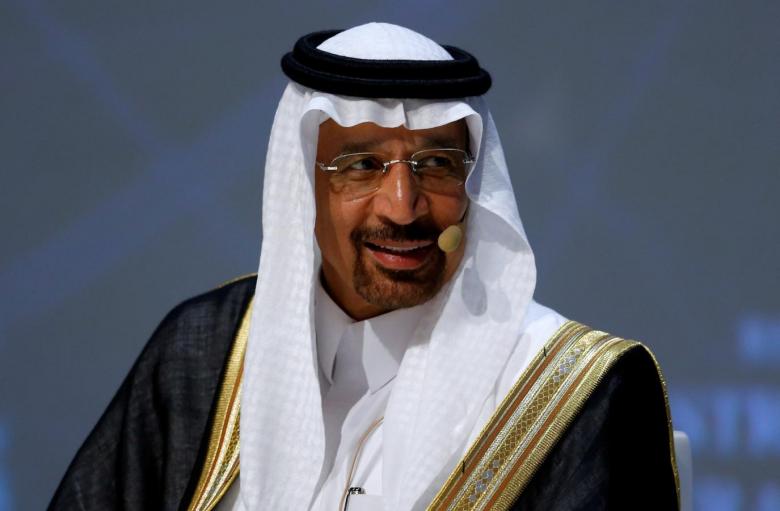Dhahran- Saudi Energy Minister Khaled al-Falih said that the oil market has been showing a growing shift towards the right path, but OPEC agreed oil cuts need time before completely relieving the present glut.
OPEC’s first in eight years initiative on curbing production, which also saw the joining of non-OPEC oil producers, was a joint effort aimed at reducing the market oversupply.
Falih also highlighted that all deal partakers have shown a 100 percent commitment in April and May, and that most short-term market fluxes are considered spontaneous, pointing out that the Kingdom also backs Libya’s oil production agenda.
“It isn’t suitable to weigh in on Libya to slow the pace of its production recovery.”
He said that production levels in Libya and Nigeria are within the range determined when OPEC decided to cut output for the first time since 2008 in Algeria.
“They shouldn’t be considered a threat to the initiative.”
Output rose by 336,000 barrels per day (bpd) in May to 32.14 million barrels per day (bpd) led by a rebound in Nigeria and Libya, OPEC said last week in its monthly report.
In general, medium and long term indicators display an increase in demand for oil byproducts, said Falih in an interview with Asharq Al-Awsat in the Saudi eastern city, Dhahran.
Falih also hoped that Libyans retain a healthy level for natural production which they are entitled to.
OPEC-members Nigeria and Libya were exempted from supply cuts because unrest had curbed their output.
He added that Saudi Arabia is seeking to double on gas production in coming years, balancing the mix of energy production it has. Gas production will enhance economic growth potential while fulfilling environmental conventions.
Falih also discussed future mining sector prospects and non-oil manufacturing.
He pointed out that there are two axes for building a distinctive industrial sector in Saudi Arabia, saying that the future role played by research centers in the country is imperative.
The Chairman of the Board of the oil-giant Saudi Aramco also said that continued efforts for devising new and sophisticated solutions for challenges facing Saudi economy is a major function of these centers.
The King Abdullah University of Science and Technology is contributing to the Kingdom’s vast potential for a diverse and intellectual economy, added Falih.
When addressing the OPEC-brokered cut deal, Falih said that the initiative to reduce production is a step that has many advantages on several levels. And that what adds to its importance is that it represents the first agreement concluded by OPEC for eight years.
“This agreement came at a time when many analysts and market observers were skeptical about the organization’s ability to play its role. It is not limited to Russia alone, but includes 10 other non-OPEC producer countries.”
The deal ushers in a new era in which OPEC and non-OPEC major oil producers are able to balance markets, which will hopefully develop a sustainable mechanism.
“When we talk about implementing the agreement, we find that the participants’ commitment reached an unprecedented level in the first five months. Reaching a 100 percent in April and May.”
“I visited many partaking countries over the past months, met with my colleagues and continued to communicate regularly with them, and found that they we are all committed to the success of this initiative,” added Falih.
Commenting on crude prices slipping, Falih said “it was not our goal when launching this initiative in Algeria to reach a specific price.”
“Prices are determined by markets driven by many variables beyond the control of producing countries and unpredictable,” he explained.
Most day to day fluxes in the market are automatic reactions to a number of short-term factors such as news headlines, forecasts of production from some sources that may not eventually materialize, Falih further added.
“It is worth distinguishing between these fluctuations and the long-term market fundamentals, which we are trying to influence by controlling production,” the former Aramco CEO said.
“In my opinion, market fundamentals are going in the right direction, but in light of the large surplus in stockpiles over the past years, the cut needs time to take effect,” he told Asharq Al-Awsat.
“Current expectations indicate the market to rebalance in the fourth quarter of this year taking into account an increase in shale oil production,” he said.
Falih said there was a relatively big draw of around 50 million barrels from floating storage facilities and a drop in Organization for Economic Cooperation and Development onshore storage of 65 million barrels compared to July last year. “The market often tends to ignore these criteria and focus on the drop in US inventories that came below expectations.”
